
The Great Locomotive Chase was a military raid that occurred April 12, 1862, in northern Georgia during the American Civil War. Volunteers from the Union Army, led by civilian scout James J. Andrews, commandeered a train, The General, and took it northward toward Chattanooga, Tennessee, doing as much damage as possible to the vital Western and Atlantic Railroad (W&A) line from Atlanta to Chattanooga as they went. They were pursued by Confederate forces at first on foot, and later on a succession of locomotives, including The Texas, for 87 miles (140 km).

Jacob Wilson Parrott was an American soldier and carpenter. He was the first recipient of the Medal of Honor, a new military award first presented by the United States Department of War to six Union Army soldiers who participated in the Great Locomotive Chase in 1862 during the American Civil War (1861–1865).

The 33rd Ohio Infantry Regiment was an infantry regiment in the Union Army during the American Civil War.

Elihu Harlam Mason was a Union Army soldier in the American Civil War and a recipient of the United States military's highest decoration, the Medal of Honor, for his actions in the Great Locomotive Chase.

Wilson Wright Brown was a soldier and recipient of the Medal of Honor for his role in the Great Locomotive Chase during the American Civil War.

William Bensinger was an American soldier who fought for the Union in the American Civil War. On March 25, 1863, he was the second person given the country's highest award for bravery during combat, the Medal of Honor, for his actions during the Great Locomotive Chase in Georgia in April 1862.

Daniel Allen Dorsey was an American soldier who fought in the American Civil War. Dorsey received the country's highest award for bravery during combat, the Medal of Honor, for his action during the Great Locomotive Chase in Georgia in April 1862. He was honored with the award on 17 September 1863.

Robert Buffum was an American soldier who fought in the American Civil War. Buffum was the third person to receive the country's highest award for bravery during combat, the Medal of Honor, for his action during the Great Locomotive Chase in Georgia in April 1862. He was honored with the award on 25 March 1863.
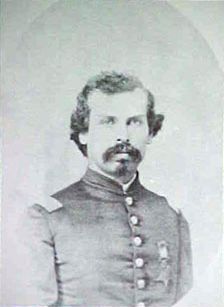
Mark Wood was an American soldier who fought in the American Civil War. Wood received his country's highest award for bravery during combat, the Medal of Honor, for his role in the celebrated Great Locomotive Chase. Wood and a fellow participant in the raid, John A. Wilson, were captured close to Union lines in Stevenson, Alabama after they abandoned The General. Wood and Wilson escaped from captivity and after sailing down the Chattahoochee River, were rescued by a Union ship. He was honored with the award on May 12, 1865.
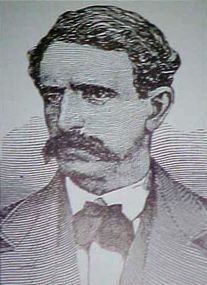
Martin Jones Hawkins was a Union Army officer in the American Civil War who received the U.S. military's highest decoration, the Medal of Honor.

Philip Gephart Shadrach was an American soldier who was executed in 1862 for his participation in the Great Locomotive Chase. As a result of his involvement, he was posthumously awarded a Medal of Honor by President Joseph Biden on July 3, 2024.

John Reed Porter was a recipient of the Medal of Honor, a military award presented by the United States Department of War to 18 Union Army soldiers who participated in the Great Locomotive Chase in 1862 during the American Civil War (1861–1865). He joined Union Army in 1861 and participated in the battles of Chickamauga, Stones River, Bentonville, and the campaigns of Chattanooga and Atlanta. At the end of the war he was a first lieutenant.

William Henry Harrison Reddick (1840–1903) was an American Civil War Medal of Honor recipient. He received the Medal of Honor for his actions during the Andrews Raid, also known as the Great Locomotive Chase or the Mitchell Raid. Reddick was born on September 18, 1840, in Locust Grove, Ohio, and died on November 8, 1903, in Muscatine, Iowa. He is buried at the Lettsville Cemetery in Letts, Iowa. He worked as a farmer after his discharge from the military.

Marion A. Ross was a sergeant major of the United States Army who was awarded the Medal of Honor for gallantry during the American Civil War. He was posthumously awarded the medal in September 1863 for actions performed during the Great Locomotive Chase in April 1862.
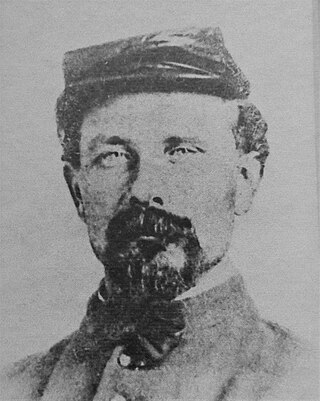
John Alfred Wilson was a member of the Andrew's Raid and one of the first recipients of the Medal of Honor.
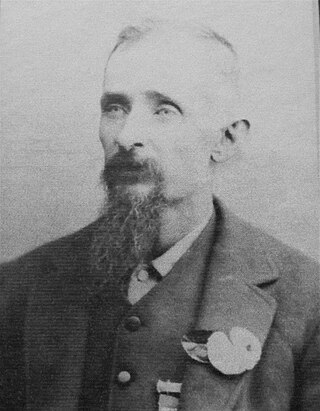
John Wollam was a participant in the Great Locomotive Chase and recipient of the Medal of Honor.
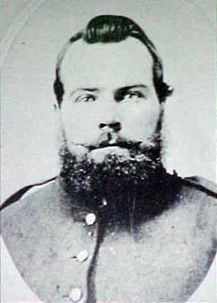
Samuel Slavens was a participant in the Andrew's Raid and a recipient of the Medal of Honor.

John Morehead Scott was a sergeant in the United States Army who was awarded the Medal of Honor for gallantry during the American Civil War. Scott was awarded the medal posthumously on 27 April 1865 for actions performed during the Great Locomotive Chase on 12 April 1862.

William James Knight (1837–1916) was an American soldier, participant in the Andrews raid and Medal of Honor recipient.

George Davenport Wilson was an American Civil War soldier and Medal of Honor recipient.




















